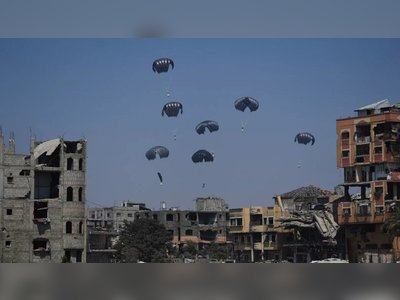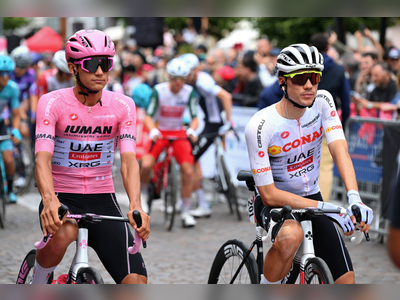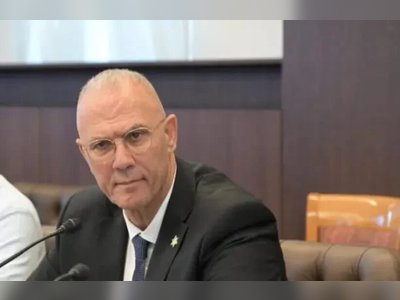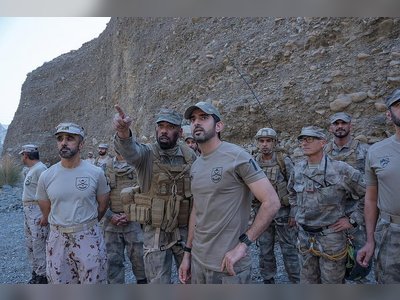
Ukraine Faces Pressure as Leaders Seek Diplomatic Solutions to Ongoing Conflict
Ukrainian President Volodymyr Zelensky under increasing pressure for negotiations with Russia amid varying international sentiments.
Ukrainian President Volodymyr Zelensky is experiencing mounting pressure to swiftly cooperate with the United States to bring an end to the ongoing conflict with Russia.
White House National Security Advisor Mike Waltz stated that former President Donald Trump is very displeased with Zelensky, highlighting his reluctance to come to the negotiation table and capitalize on the opportunity extended by the U.S. Waltz expressed hope that Zelensky would ultimately agree to negotiations soon.
U.S. Secretary of State Marco Rubio has indicated that the primary objective of recent bilateral talks with Russia was to ensure that Moscow is serious about concluding the war in Ukraine.
Rubio remarked, "I cannot yet answer the question of whether they are serious about peace."
Rubio denied the notion that Washington began discussions with Russia without including Kyiv and its European allies, stating, "It is unfair to say we did not consult anyone about this; we spoke to the Ukrainians throughout the process.
It is also not correct that we did not consult our European allies; I had discussions with five foreign ministers following my meetings with the Russians and before."
Rubio also noted that any potential meeting between Trump and Russian President Vladimir Putin would largely depend on whether progress can be made towards ending the war in Ukraine.
In a related development, President Zelensky expressed renewed hope regarding an agreement with Washington following talks with U.S. envoy Keith Kellogg.
Zelensky emphasized that the specifics of any agreement are crucial, proposing that better-formulated details would lead to more favorable outcomes.
He advocated for a strong partnership between Ukraine and the United States, stating that such relations would benefit the entire world.
Meanwhile, French President Emmanuel Macron plans to use his upcoming visit to the White House to persuade Trump to align with European allies.
Macron intends to convey to Trump that demonstrating any weakness towards Putin would complicate handling issues with China and Iran, stating, "I will tell him: Deep down, you cannot be weak in front of Putin.
This is not you, not what you are about, and not in your interest."
British Foreign Secretary David Lammy has voiced skepticism regarding Russia's willingness to pursue peace in Ukraine, citing Russian Foreign Minister Sergey Lavrov's remarks during the G20 meeting in South Africa.
Lammy noted, "I have to say that when I listened to what the Russians said, and what Lavrov said in the session, I do not see any genuine desire for peace."
Conversely, Chinese Foreign Minister Wang Yi informed his Group of Twenty counterparts that a window for peace is opening in Ukraine.
Wang noted an increase in calls for peace talks and suggested a current opportunity.
German Chancellor Olaf Scholz has stated the importance of ensuring Ukraine can defend itself, even if a ceasefire agreement is reached.
He emphasized that Europe must guarantee that Ukraine is not left vulnerable despite ongoing negotiations, remarking, "We are still far from a ceasefire.
The war continues daily with maximum brutality."
Scholz also expressed uncertainty about the role of international forces in Ukraine if a ceasefire is established.
Additionally, Friedrich Merz, the Christian Democratic Union's candidate for chancellor in Germany, expressed shock over Trump's remarks regarding the war in Ukraine, labeling them as a classic reversal of the roles of perpetrator and victim, which he regards as the narrative presented by Putin for years.
White House National Security Advisor Mike Waltz stated that former President Donald Trump is very displeased with Zelensky, highlighting his reluctance to come to the negotiation table and capitalize on the opportunity extended by the U.S. Waltz expressed hope that Zelensky would ultimately agree to negotiations soon.
U.S. Secretary of State Marco Rubio has indicated that the primary objective of recent bilateral talks with Russia was to ensure that Moscow is serious about concluding the war in Ukraine.
Rubio remarked, "I cannot yet answer the question of whether they are serious about peace."
Rubio denied the notion that Washington began discussions with Russia without including Kyiv and its European allies, stating, "It is unfair to say we did not consult anyone about this; we spoke to the Ukrainians throughout the process.
It is also not correct that we did not consult our European allies; I had discussions with five foreign ministers following my meetings with the Russians and before."
Rubio also noted that any potential meeting between Trump and Russian President Vladimir Putin would largely depend on whether progress can be made towards ending the war in Ukraine.
In a related development, President Zelensky expressed renewed hope regarding an agreement with Washington following talks with U.S. envoy Keith Kellogg.
Zelensky emphasized that the specifics of any agreement are crucial, proposing that better-formulated details would lead to more favorable outcomes.
He advocated for a strong partnership between Ukraine and the United States, stating that such relations would benefit the entire world.
Meanwhile, French President Emmanuel Macron plans to use his upcoming visit to the White House to persuade Trump to align with European allies.
Macron intends to convey to Trump that demonstrating any weakness towards Putin would complicate handling issues with China and Iran, stating, "I will tell him: Deep down, you cannot be weak in front of Putin.
This is not you, not what you are about, and not in your interest."
British Foreign Secretary David Lammy has voiced skepticism regarding Russia's willingness to pursue peace in Ukraine, citing Russian Foreign Minister Sergey Lavrov's remarks during the G20 meeting in South Africa.
Lammy noted, "I have to say that when I listened to what the Russians said, and what Lavrov said in the session, I do not see any genuine desire for peace."
Conversely, Chinese Foreign Minister Wang Yi informed his Group of Twenty counterparts that a window for peace is opening in Ukraine.
Wang noted an increase in calls for peace talks and suggested a current opportunity.
German Chancellor Olaf Scholz has stated the importance of ensuring Ukraine can defend itself, even if a ceasefire agreement is reached.
He emphasized that Europe must guarantee that Ukraine is not left vulnerable despite ongoing negotiations, remarking, "We are still far from a ceasefire.
The war continues daily with maximum brutality."
Scholz also expressed uncertainty about the role of international forces in Ukraine if a ceasefire is established.
Additionally, Friedrich Merz, the Christian Democratic Union's candidate for chancellor in Germany, expressed shock over Trump's remarks regarding the war in Ukraine, labeling them as a classic reversal of the roles of perpetrator and victim, which he regards as the narrative presented by Putin for years.
Translation:
Translated by AI









